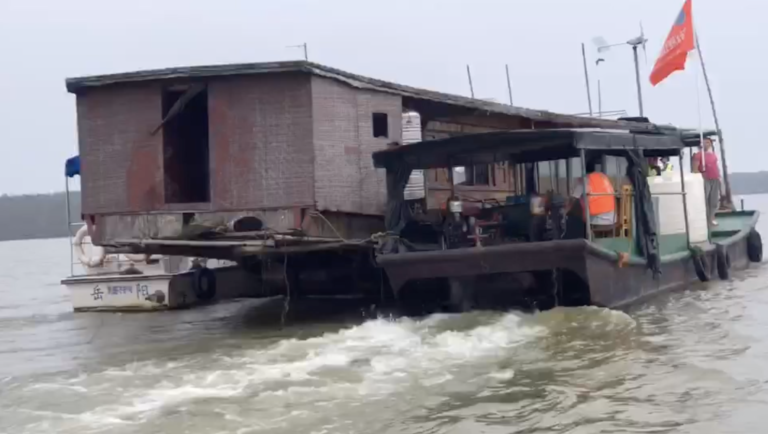
By Katherine Olson, Communications Associate with Waterkeepers China
Many environmental organizations know the importance of getting youth engaged with their work — and Dongting Lake Waterkeeper is no exception. Not only does the group want to create opportunities for hands-on experiential learning, but they want to ensure kids have an experience they will never forget, engraining unique and special memories in their minds to inspire a future generation of water protectors.
A chance to stay on a traditional Chinese houseboat is exactly the type of unforgettable experience they provide. It is a one-of-a-kind opportunity, especially now, given the recently-enacted 10-year fishing ban on the Yangtze River, of which Dongting Lake is a part. These houseboats are now nearly nonexistent on the surface of the lake, where they were once a common sight — a little too common, in fact, as too many fishermen were competing for too few fish. This caused increasingly extreme and destructive fishing methods to be used until the government finally hit the brakes with a fishing ban and started offering financial incentives and training to give the fishermen a new life on land.
I had the opportunity to stay on one of these houseboats during a Dongting Lake Waterkeeper youth trip. Bobbing on the lake’s vast and ocean-like waters, the kids and I listened to the stories of how the Dongting fishing culture transformed from humans being one part of a complex and thriving lake food web, to a vicious cycle of poverty and exhausted, strained natural resources. Ximi, Dongting Lake Waterkeeper’s lecturer, kept us enraptured with her stories of the ecologically crippling destruction caused by traps and electrofishing, her childhood growing up in the countryside, and the brave and inspiring work of the current Waterkeeper, Dongshun, and his father, the organization’s founder.
The kids didn’t just listen to stories, they took notes about the surroundings and environmental conditions, made a map of the boat’s route from the dock to the semi-submerged forest where we spent the night, watched aquatic birds flit through the trees, and even got the exciting privilege of seeing a small family of finless porpoises jumping near our boat (learn more about these critically endangered species, and how Dongting Lake Waterkeeper is trying to help, here).
From the wide flat deck of the boat, we watched the tiny far-off landscape of Hunan Province rush by on one side and the vast infinite horizon on the other side: the scenery was constantly changing, never the same for more than a moment at a time. After dropping anchor in the midst of the water forest, dinner was served on a rickety table with flashlights hanging from the ceiling to add some light to the dim and gauzy evening. After Ximu lulled the kids to sleep with bedtime stories about her childhood and the “lake life,” the wind stirred up waves on the lake’s surface, rocking the boat back and forth like a cradle and filling the night air with the howls of wind through the trees. Indeed, every aspect of boat life was different from our everyday lives in the city. And every element of it was unique, further imprinting the memory of this trip in my mind, further imprinting all of Ximi’s bittersweet stories of Dongting Lake.
Even in that short time, just one day and one night, the feeling of freedom and openness on the lake was markedly different from life in the city. How would the fishermen, who themselves as well as their fathers and grandfathers had been born and raised on boats such as these, adapt to the concrete cage of city life? Life on a boat is all they know. One can’t help but wonder what future lies ahead of them, and what future lies ahead of the newly-liberated lake. All that is certain is that Dongshun and his father will always be there, prowling the lake’s surrounding lands and its waters, searching for pollution, for illegal fishing, for injured wildlife. No matter what bans and policies are enacted for Dongting Lake, one thing is for certain: Dongting Lake Waterkeeper, and its mission to protect these waters, are always welcome.